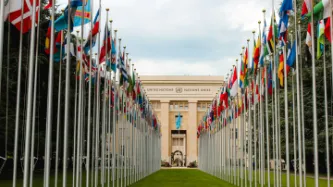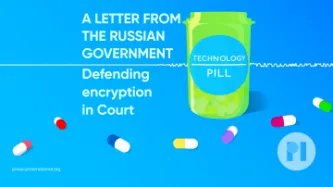Advanced Search
Content Type: Advocacy
The Open informal consultations on lethal autonomous weapons systems, held in accordance with General Assembly resolution 79/62 at the UN in New York on 12-13 May 2025, examined various legal, humanitarian, security, technological, and ethical aspects of these weapons. These consultations aimed to broaden the scope of AWS discussions beyond those held by the Group of Governmental Experts (GGE) at the UN in Geneva. Find out more about what happened during the discussions at Researching Critical…
Content Type: Press release
FOR IMMEDIATE RELEASELONDON - 7 April 2025The Investigatory Powers Tribunal (IPT) has confirmed it will hear Privacy International, Liberty and two individuals’ challenge to the legality of the Home Secretary’s decision to use her powers to secretly force Apple to allegedly give the UK Government access to users’ secured data stored on iCloud. The challenge will also cover the legality of the Government issuing these types of notices at all. Privacy International and Liberty,…
Content Type: News & Analysis
We’ve been asked a lot lately about whether it is safe to travel, particularly to the US. And it’s not surprising why: the US Government is increasing their cruelty at borders.Border management today is fueled by our data, but government officials want more. They want as much data as they can get to catch you out. They’ve reportedly detained or deported people based on their free speech activities, denying entry on tenuous grounds like having the wrong photos on phones (including in in the ‘…
Content Type: Advocacy
We believe the Government's position of refusing to confirm or deny the existence of the Technical Capability Notice or acknowledge Apple's appeal is untenable and violates principles of transparency and accountability.
Content Type: Explainer
Imagine this: a power that secretly orders someone anywhere in the world to abide and the receiver can’t tell anyone, can’t even publicly say if they disagree, and can’t really question the power in open court because the secret order is, well, secret. Oh and that power affects billions of people’s security and their data. And despite being affected, we too can’t question the secret order.In this piece we will outline what’s ridiculous, the absurd, and the downright disturbing about what’s…
Content Type: Advocacy
Our submission made the following recommendations to the Committee regarding the Kenya:Review and amend the proposed digital identity system, the Maisha Numba, to ensure it aligns with Kenya’s national and international human rights obligations in its design and implementation, and adopts legal, policy and technical safeguards to prevent exclusion and marginalisation.Ensure that measures taken to develop digital public infrastructures abide by Kenya’s national and international human rights…
Content Type: Advocacy
In the wake of Privacy International’s (PI) campaign against the unfettered use of Facial Recognition Technology in the UK, MPs gave inadequate responses to concerns raised by members of the public about the roll-out of this pernicious mass-surveillance technology in public spaces. Their responses also sidestep calls on them to take action.The UK is sleepwalking towards the end of privacy in public. The spread of insidious Facial Recognition Technology (FRT) in public spaces across the country…
Content Type: Long Read
The fourth edition of PI’s Guide to International Law and Surveillance provides the most hard-hitting past and recent results on international human rights law that reinforce the core human rights principles and standards on surveillance. We hope that it will continue helping researchers, activists, journalists, policymakers, and anyone else working on these issues.The new edition includes, among others, entries on (extra)territorial jurisdiction in surveillance, surveillance of public…
Content Type: Report
First published in 2017, PI’s Guide to International Law and Surveillance is an attempt to collate relevant excerpts from these judgments and reports into a single principled guide that will be regularly updated. This is the fourth edition of the Guide. It has been updated it to reflect the most relevant legal developments until March 2024.The Guide aspires to be a handy reference tool for anyone engaging in campaigning, advocacy, and scholarly research, on these issues. The fourth…
Content Type: Video
The case dealt with a Russian law obliging telecommunications service providers to indiscriminately retain content and communications data for certain time periods, as well as a 2017 disclosure order by the Russian Federal Security Service requiring Telegram Messenger company to disclose technical information which would facilitate “the decoding of communications”.Links:PI case pageECtHR judgment in the Podchasov casePI's work on encryptionPI's report on End-to-End Encryption (E2EE)More…
Content Type: Advocacy
BackgroundThe Snowden revelations and subsequent litigation have repeatedly identified unlawful state surveillance by UK agencies. In response, the UK Parliament passed the highly controversial Investigatory Powers Act 2016 (IPA), which authorised massive, suspicionless surveillance on a scale never seen before, with insufficient safeguards or independent oversight.Privacy International led legal challenges to this mass surveillance regime both before and after the Act became law. The Act…
Content Type: Advocacy
In January 2024, PI responded to the call for input to the report by the UN High Commissioner for Human Rights on the impact of arms transfers on human rights, with a focus on the role of access to information in preventing, mitigating, and responding to the negative human rights impact of arms transfers - offering our experiences of navigating access to information regimes in the UK and the EU.
Access to information laws and processes are crucial in uncovering details of states' capabilities…
Content Type: Advocacy
We are responding to the UK Government's consultation to expand its powers around Technical Capabilities Notices and National Security Notices.
Background
Following Edward Snowden's revelations about the illegal and expansive secret powers of the US and UK intelligence agencies, the UK Government took the opportunity to, rather than reflect on what powers are proportionate in the modern era, to expand its arsenal of surveillance powers.
One of the powers it added was the ability to issue…
Content Type: Press release
In a landmark judgment, handed down today (Monday 30 January 2023), the Investigatory Powers Tribunal have found that there were “very serious failings” at the highest levels of MI5 to comply with privacy safeguards from as early as 2014, and that successive Home Secretaries did not to enquire into or resolve these long-standing rule-breaking despite obvious red flags.Human rights organisations Liberty and Privacy International, who brought this significant legal case in January 2020, have…
Content Type: News & Analysis
We have been fighting for transparency and stronger regulation of the use of IMSI catchers by law enforcement in the UK since 2016. The UK police forces have been very secretive about the use of IMSI catchers – maintaining a strict “neither confirm nor deny” (NCND) policy. In our efforts to seek greater clarity we wrote to the UK body which monitors the use of covert investigatory powers, the Investigatory Powers Commissioner’s Office (IPCO), asking the Commissioner to revisit this…
Content Type: Long Read
In the UK, successive government ministers and members of parliament have made emotive proclamations about the malaise of "public sector fraud".
This year, former Work and Pensions Secretary Therese Coffey said that the welfare system "is not a cash machine for callous criminals and it’s vital that the government ensures money is well spent...[and] fraud is an ever-present threat."
In 2013, the UK's minister for the disabled made numerous claims that there were "vast numbers of bogus disabled […
Content Type: Report
End-to-end encryption (E2EE) contributes significantly to security and privacy. For that reason, PI has long been in favour of the deployment of robust E2EE.Encryption is a way of securing digital communications using mathematical algorithms that protect the content of a communication while in transmission or storage. It has become essential to our modern digital communications, from personal emails to bank transactions. End-to-end encryption is a form of encryption that is even more private.…
Content Type: Long Read
Introduction
In response to the unprecedented social, economic, and public health threats posed by the Covid-19 pandemic, the World Bank financed at least 232 "Covid-19 Response" projects. The projects were implemented across countries the World Bank classifies as middle and low-income.
This article will focus on eight (8) Covid-19 Response projects which sought to deliver social assistance to individuals and families on a "non-contributory" basis (this means that the intended beneficiaries…
Content Type: Examples
Just as China uses technology system called "Integrated Joint Operations Platform" to control and surveil the persecuted population of Uighurs while restricting their movement and branding dissent as "terrorism", the Israeli military is using facial recognition and a massive database of personal information to control millions of Palestinians in the occupied West Bank. In November 2021, NSO Group's Pegasus spyware was found on the phones of six Palestinian human rights activists, three of whom…
Content Type: Examples
The Israeli minister of public security has joined police in denying claims in an article in Calcalist that the country's police force have used NSO Group's Pegasus software to spy on the phones of people who led protests against former premier Benjamin Netanyahu. Calcalist reported that the surveillance was carried out without court supervision or oversight of how the data was used. The daily Haaretz newspaper also reported that it had seen a 2013 invoice in which NSO billed police @@2.7…
Content Type: Advocacy
Now is the time to strengthen not weaken data protection to keep us all safe. Here we outline some edited areas of our consultation response that highlight the impact of the proposed loss or weakening of many important protections:
The proposal to broadening consent and further processing for research purposes:
PI urges caution with regard to provisions that seek to potentially undermine the strict conditions around obtaining consent. The GDPR placed stronger conditions on obtaining consent…
Content Type: Report
Privacy International’s submissions for the Independent Chief Inspector of Borders and Immigration inspection of the Home Office Satellite Tracking Service Programme
The Home Office have introduced 24/7 electronic monitoring and collection of the location data of migrants via GPS ankle tags. This seismic change cannot be overstated. The use of GPS tags and intention to use location data, kept for six years after the tag is removed, in immigration decision-making goes far beyond the mere…
Content Type: Advocacy
In line with WHO's commitment to a human rights-based approach to health, Privacy International believes the following elements procedural and substantive elements must be included:
Open, inclusive and multi-stakeholder process
The drafting and negotiation process of this international instrument must allow for the meaningful participation of a wide range of civil society organisations (CSOs) and reflect the commitment from the WHO and Member States to receive and respond to CSOs…
Content Type: News & Analysis
The UK government has acknowledged that section 8(4) of the Regulation of Investigatory Powers Act (“RIPA”) (which has since been repealed) violated Articles 8 and 10 of the European Convention on Human Rights (ECHR). In relation to Article 10, it specifically acknowledged that the way in which security agencies handled confidential journalistic material violated fundamental rights protected by Article 10.
As part of a friendly settlement with two applicants, the UK government acknowledged…
Content Type: News & Analysis
Background
Today judgment has been handed down in the landmark case of R (HM and MA and KH) v Secretary of State for the Home Department.
This is a Judicial Review decision concerning the UK Home Office’s secret and blanket policy of seizing mobile phones of all migrants who arrived to the UK by small boat between April 2020 and November 2020, and extracting data from all phones. PI was a third party intervener in the case.
The case revealed that migrants were searched on arrival at Tug Haven…
Content Type: Explainer
Introduction/Background
Electronic tags have been a key part of criminal justice offender management for over 20 years, being used in the United States since the mid 1980’s and in the UK and some other commonwealth countries since 2003. In 2021 the UK introduced GPS tagging for immigration bail.
The tag is predominantly used to curtail the liberties of individuals. For those on criminal bail its intended use includes managing return into communities while deterring reoffending.
As we explore…
Content Type: News & Analysis
In a ruling handed down on 14 October 2021 by the High Court of Kenya in relation to an application filed by Katiba Institute calling for a halt to the rollout of the Huduma card in the absence of a data impact assessment, the Kenyan High Court found that the Data Protection Act applied retrospectively.
Background to the case
Huduma Namba as initially proposed
In January 2019, the Kenyan Statute Law (Miscellaneous Amendment) Act No. 18 of 2018 came into effect, introducing a raft of amendments…
Content Type: Explainer
Following sustained reporting by researchers, journalists and activists around the world, including recent disclosures exposed by the PegasusProject, the surveillance industry is facing scrutiny like never before.
In the latest move, eighteen U.S. lawmakers have today demanded that the U.S. government imposes sanctions on four non-US surveillance companies for, as they mention in their letter, facilitating “disappearance, torture and murder of human rights activists and journalists”.
The move…
Content Type: Advocacy
The Office of the Privacy Commissioner of Canada has developed draft privacy guidance for police agencies' use of FRT, with a view to ensuring any use of FRT "complies with the law, minimizes privacy risks, and respects privacy rights". The Commissioner is undergoing consultation in relation to this guidance.
Privacy International and the Canadian Civil Liberties Association ("CCLA") welcome the Commissioner's efforts to strengthen the framework around police use of facial recognition, and the…
Content Type: News & Analysis
Update: Based on the complaint, on 30 November 2021 the Ombudsman opened an inquiry into whether the European Commission failed to take into account human rights concerns or carry out human rights impact assessments before providing support to African countries to develop surveillance capabilities.
___
Privacy International (PI) together with a coalition of human rights groups have today called on the European Ombudsman, the EU’s oversight body, to investigate evidence that the block is…


























